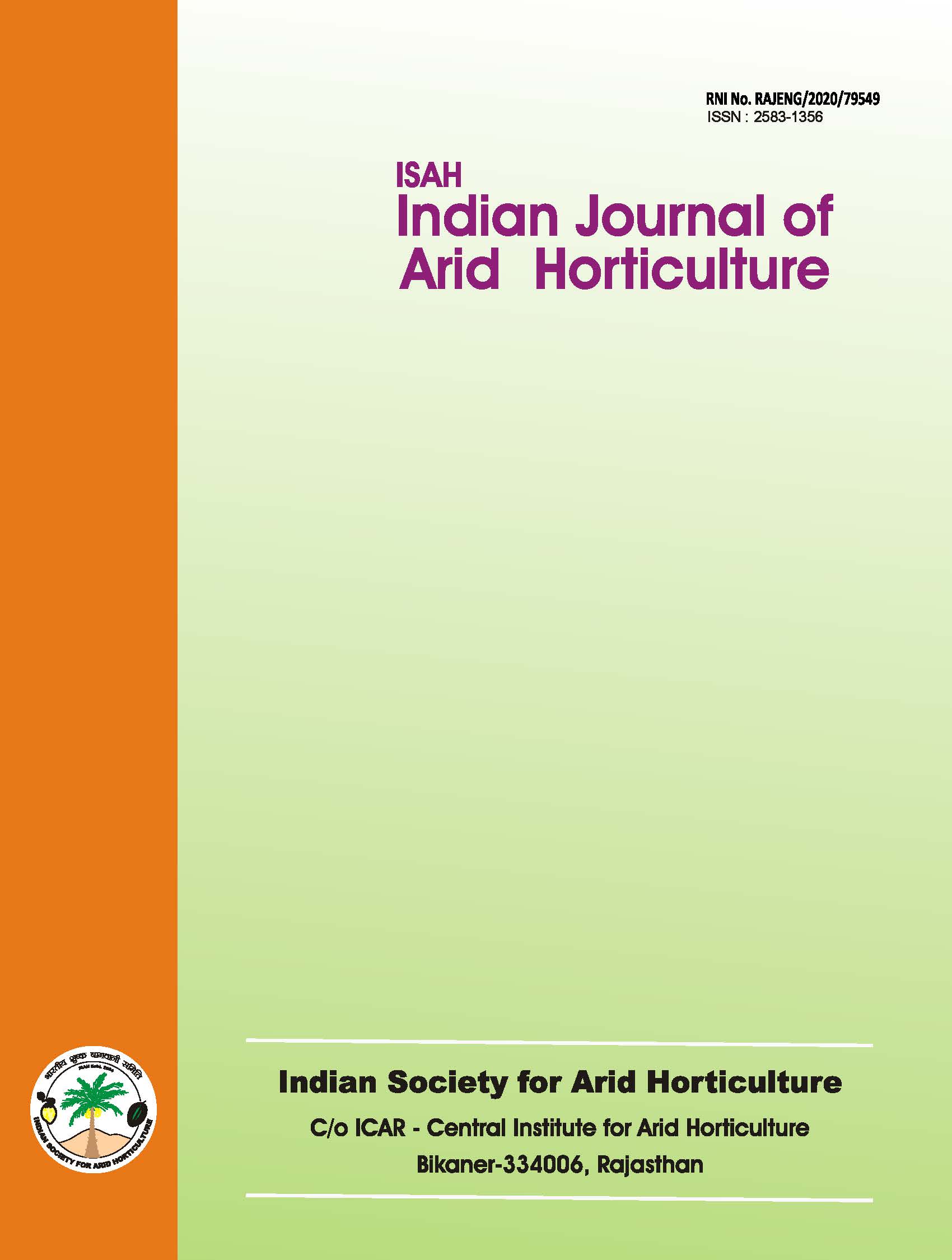Eco-friendly management of fruit borer (Meridarchis scyrodes Meyrick) in ber
Keywords:
Ber (Ziziphus mauritiana), eco-friendly management, fruit borer (Meridarchis scyrodes)Abstract
All the treatments were found significantly superior over control in reducing the fruit borer incidence in ber. Whereas the treatments Profenophos 50 EC 0.05 % (18.33%), NSKE @ 5 % (20.95%) and Azadirachtin 3000 ppm (21.73%) found significantly superior over rest of the treatments in reducing the borer incidence. The healthy fruit yield data revealed that more or less treatment Profenophos 50 EC 0.05 % gave significantly higher yield and was remain at par with NSKE @ 5% and Azadirachtin 3000 ppm treatments during the year 2008-09 to 2012-13 except the year 2011-12. Similarly in pooled results treatment Profenophos 50 EC 0.05 % give significantly higher yield (41.55 kg/tree.) followed by treatments Azadirachtin 3000 ppm (35.99 kg/tree.) and NSKE @ 5 % (34.79 kg/tree.) Highest gross income of Rs. 115500/ha was recorded in the treatment Profenophos 50 EC 0.05 %. Highest net income of Rs. 96700/ha, additional income of Rs. 46850/ha and ICBR 1:2.49 was recorded in treatment Profenophos 50 EC 0.05% followed by treatment Azadirachtin3000 ppm @25 ml/ltr. (1:1.64).and NSKE @5%(1:1.52).
Downloads
References
Batra, H. N. 1953. Biology and control of Dacus diversus Conquillet and Carpomyia vesuviana Costa and important notes on other fruit flies in India. Indian Journal of Agricultural Science, 23:87-112. Cherian, M. C. and Sunderam, C. V. 1941. Proceedings of the
th Indian Science Congress, III: 191.
Pareek, O. P. 1996. Indian jujube and pomegranate. In 50 years of Crop Science Research in India, eds. Paroda, R. S. and Chadha, K.L., ICAR, New Delhi, India: 557- 573.
Pareek, O. P. and Vishal Nath. 1996. Ber. In Coordinated Fruit Research in Indian Arid Zone - A two decades profile (1976-1995). National Research Centre for Arid Horticulture, Bikaner, India: 9-30.
Patil, Praveen and Patil, B. V. 1997 Management of Ber fruit borer, Meridarchis scyrodes Meyrick (Carposinidae: Lepidoptera). Karnataka. J. Agris. Sci. 10(1): 52-55
Popli, S., Kathpal, T. S. and Lakra, R. K. 1980. Note on dissipation of malathion residues from jujube fruits and leaves. Indian Journal of Agricultural Science, 50(2): 191-192.
Praveen, Patil, Patil, B.V., Rahman, S.M., Sreenivasa, A. G., Patil, P and Reddy, P. P. 1998. Survey of insect pests of ber in North Karnataka with special reference to management of fruit borer, Meridarchis scyrodes Meyrick. (Ed.) Kumar, N.K K. and Varghese, A. In: Advances in IPM for horticultural crops. Proceedings of the First National Symposium on Pest management in Horticultural Crops: environmental implications and thrusts, Bangalore, India, 15-17 October 1997.:52-57.
Rajaram, V. and Siddeswaran, K. 2006. Efficacy of insecticides and plant products against the fruit borer and fruit fly in ber under rain fed condition. Internat. J. Agris. Sci. 2(2): 538-540

